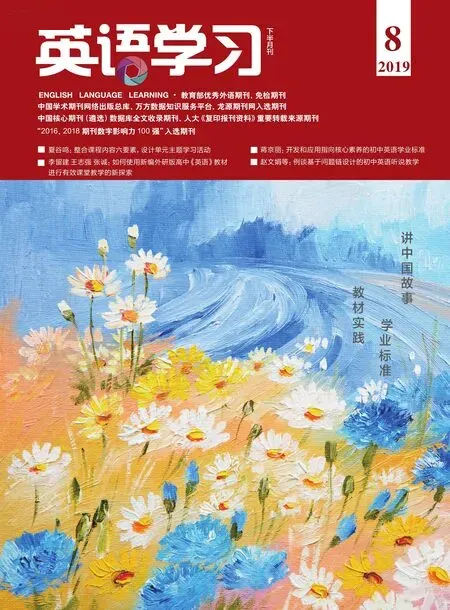Zhang Qian’s Missions to the Western Regions张骞出使西域
编者按:在发展素质教育、全面落实立德树人根本任务的今天,英语教育工作者要有意识地引导学生用英语讲述中国故事,传播中华优秀文化,为实现“培养具有中国情怀、国际视野和跨文化沟通能力的社会主义建设者和接班人”的英语课程目标而努力。《英语学习》自本刊起将连载程晓堂教授、张祖春研究员共同主编,湖北教育出版社出版的《学英语 讲中国故事》的选篇,旨在丰富教师教学材料的同时,表达和传播中华优秀文化,培养学生的中国情怀。
本篇选自《学英语 讲中国故事——人物故事篇》。中华上下五千年的历史长河中,历史人物数不胜数,著名人物不计其数。不同时期的历史人物对历史发展有着不同的影响和作用。通过阅读本文,您能了解中国历史进程中的风云人物——张骞。从张骞出使西域的破冰之旅中,读者可清晰看到中国“一带一路”的文化印记,同时也能为用英语讲述中国人物故事作好语言准备。

As an official and diplomat of the Han Dynasty, Zhang Qian was appointed to travel to the Western Regions by the emperor. According to Records of the Grand Historian ( 《史记》) written by Sima Qian, Zhang Qian visited many countries during his travels to the West.Zhang Qian was the fi rst off i cial diplomat to bring back reliable information about Central Asia. He played a key role in opening China to the world of commercial trade since his travels were closely associated with the Silk Road.
Zhang Qian’s First Mission
Emperor Wu of the Han Dynasty (汉武帝 ) was interested in building up commercial ties with distant lands, but his enemy Xiongnu (匈奴) prevented him from contacting other countries. As a military officer who was familiar with the Xiongnu, Zhang Qian was sent to the Western Regions in 138 B.C., with a group of 99 members to make contact and build an alliance with the Yuezhi (大月氏) against the Xiongnu.
He went there with a guide named Ganfu (甘夫), a Xiongnu who had been caught in war. The goal of Zhang Qian’s fi rst mission was to seek a military alliance with the Yuezhi in modern Tajikistan (塔吉克斯坦). However, in order to get to the land of the Yuezhi, he had to pass through the area controlled by the Xiongnu. They caught him as well as Ganfu and put him in prison for ten years. During this time he married a Xiongnu wife and gained the trust of the Xiongnu leader. They were able to escape and eventually went to the land of the Yuezhi. The Yuezhi were agricultural people who produced strong horses and many unknown crops. Zhang spent a year there recording their culture, lifestyle and economy before he returned to central China.
During his return trip, he was again caught by the Xiongnu. Two years later,the Xiongnu leader died and in the midst of chaos, Zhang Qian escaped. Among those who went for the original mission,only Zhang Qian and Ganfu managed to return to China.
Zhang Qian returned in 125 B.C.with detailed news, showing that other splendid civilizations existed in the West. Thus Han Dynasty could develop relations with those areas. Although Zhang Qian hadn’t succeeded in his diplomatic mission, Emperor Wu of Han was fully aware of the importance of his travel. The government of the Han Dynasty benef i ted a lot from various data and information Zhang Qian gathered during his journey. These materials were not only related to the countries he visited, but also recorded what he had seen and heard on the way.
On his mission, Zhang Qian noticed products from an area now known as northern India. So Zhang Qian set out on a second mission to forge a route from China to India via Sichuan, but after many attempts, this effort proved unsuccessful.
Zhang Qian and the Silk Road
In 115 B.C., Emperor Wu of Han organized another team of 300 men,also headed by Zhang Qian, to visit the country of Wusun ( 乌孙,今新疆阿克苏地区 ), trying to persuade its ruler to be for a joint campaign. On his journey,Zhang Qian sent his assistants to the countries of Dawan (大 宛 ), Kangju (康居 ), Daxia (大夏) and the Yuezhi. After a year or so, these countries sent their envoys to Chang’an along with Han assistants.

Since then, the Han Dynasty established official relations with the countries in the Western Regions. The exchanges and communication with the Western Regions became increasingly frequent. During that time, Wusun even allowed the intermarriage with the Han people. Among the travelers to Western Regions, there were many businessmen who followed the steps of Zhang Qian.
Zhang Qian travelled to the Western Regions several times over 30 years. He devoted all his life to the establishment and development of the friendly relations between Han Dynasty and the countries in the Western Regions.His health was damaged greatly due to the hardship he endured during his long years of travelling. One year after his last diplomatic mission, he died of poor health.
From his missions he brought back many important products, among which alfalfa seeds (grown for horse fodder), strong horses with hard hooves,and knowledge of the existence of new products and technologies of the outside world were the most beneficial. His journeys also promoted a great variety of economic and cultural exchanges between the Han Dynasty and the Western Regions. Since silk became the main product traded from China, this great trade route later became known as the Silk Road (丝绸之路). The frequent economic and cultural exchanges between the East and the West promoted the development of societies in the region and the spread of civilizations along this eastwest corridor. History will remember this
Notes
alfalfa n. 苜蓿
alliance n. 联盟
diplomat n. 外交官
fodder n. 饲料
hoof n. 马蹄 ( 复数形式为 hooves )

